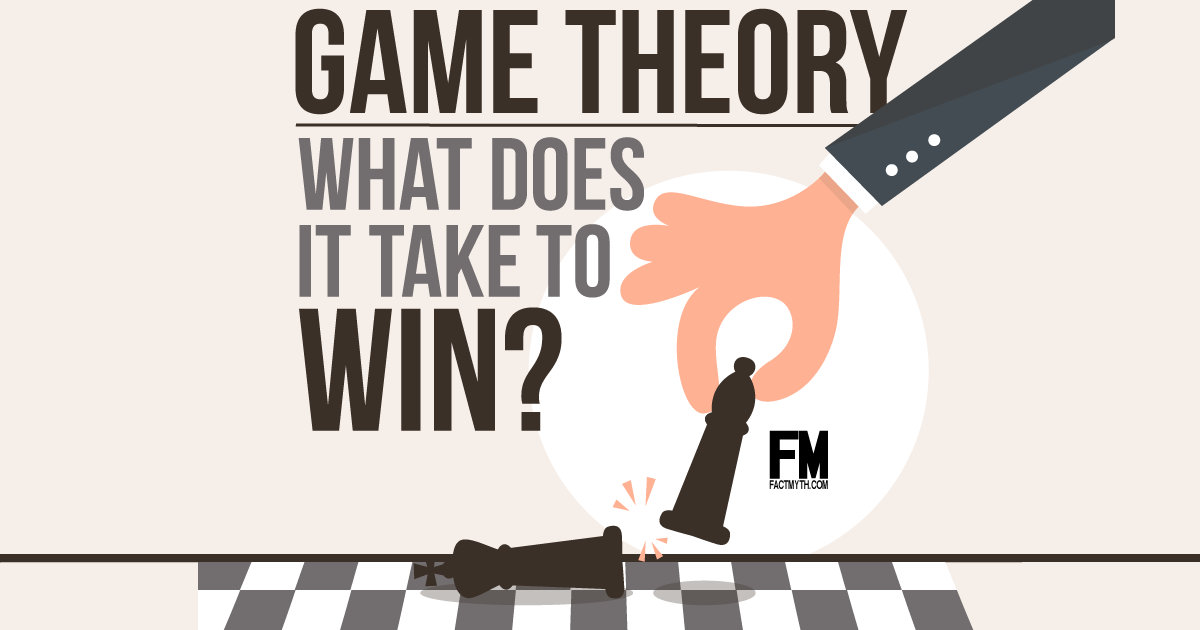Game theory is the art / science of strategy. There are many ways to express this simple concept.
Game Theory is the Science of Strategy fact

What is Game Theory?
Game theory is “the science of strategy,” a branch of mathematics that studies the strategy, rules, and statistics of decision making games and applies it to other fields. The data gleaned from studying games can be related to back to economics, political science, social science, business in general , or even biology to better understand decision making and behavior in that field.
The term “game” is in the title, but it is more a branch of complexity science than a study of games. In other words, your more likely to use game theory when studying high-level economics, cognitive computing, or political science than when playing XboX.
Below we discuss the basics of game theory its use in different fields of study. Check out this video for a great overview of game theory thinking.
Intro to Game Theory and the Dominant Strategy Equilibrium.What are the Rules of Game Theory?
To study a game it needs to meet some criteria (namely it must have an outcome that can be analyzed). An example of criteria that makes a game suitable for study may include:[1]:
- We need 2 or more agents or players.
- We need a game of skill, not chance.
- We need a “payout” or a prize.
- We need a rule set or rules in which to play.
- We need a strategy, the methods players use.
- We need an equilibrium, an ending to the game.
- We need to be able to observe and quantify the results.
Having all these things in place allows player strategy to be studied. If players played randomly, the incentive was changed, luck was involved, or the rules were changed, then the data would be harder to quantify. For reasons like this, typically games like Go or Chess are studied (as opposed to something like Call of Duty or Roulette).
TIP: Game theory is just that, theory. To some extent then, the above rules are loose.
- An excellent example of applied game theory is “the Prisoner’s Dilemma game“.
- See more about the basics of game theory from Investopedia here.
Game Theory Overview
Below we look at facts about game theory to give you a quick overview of what it is and why it is important. Check out the related links below to explore “the science of strategy”.
The Basics of Game Theory. A nice simple video to reinforce the concepts on the page.- It is likely humans have always played games, especially since forming the first civilizations and coming together as a society. The way we organize, cooperate, compete, and the psychology behind that group behavior is very fundamental to our existence as humans. It is also rather quantifiable. See a history of ancient gaming here.[2]
- Game theory takes concepts and strategies from games of all sorts, applies statistical analysis and synthesis, and then derives systems and rule-sets that can be used in fields like the social sciences and economics.
- Although it is statistics-based (and thus concerning probability and odds), game theory doesn’t tend to look at games of chance (like Roulette), rather it studies games of strategy with concrete and quantifiable rule-sets (like Chess or Go). The goal is to find user-driven patterns that can predict human behavior.
- Game theory is a hybrid-art-science with many applications. We can apply the strategy of games to cognitive computing, group behavior, military tactics, politics, organizational structures in business, economics, and more.
- There are three branches of economic theory closely related to game theory (according to David K. Levine, Department of Economics, UCLA).[3].
Decision theory – the theory of one person games regarding decision making.
General equilibrium theory – large group theory (like with taxes and policies and their related effects in regards to an industry or country).
Mechanism design theory – which looks at the consequences to rule-sets (not just their effectiveness).TIP: It’s not directly related, but see Conway’s game of life for an interesting one-player game. - In simple terms, Bayes Law (or Bayes theory) shows us that we can calculate probable truth by comparing statistics. This means we can compare complex webs of probabilities to find likely facts. This type of thinking pairs well with game theory and related economic theory. Learn more about Bayesian thinking.
- Humans are hardwired for competition and cooperation. There is something very fundamental about games from Chess to Go, to Baseball, to eSports. We can understand the complex systems that form our reality better by using game theory. General systems theory and systems thinking go hand-in-hand with game theory. Learn more about systems thinking.
- Game theory is an excellent tool for learning about group behavior and the social sciences, as it can apply mathematics to a field that is constantly having to rely on experimental data.
Check out the video below to learn more about game theory, or see a few of the following links go deeper into the theory of gaming and strategy.
Yale Courses on Game Theory (as applied to economics) a Complete Lecture Series. Now that you have had a simple overview, it is time to take a full-length course from YaleCourses. The internet is amazing. This lecture series was titled poorly and hard to find. I highly suggest you watch it.- See GameTheory.net for resources on game theory.
- See UCLA’s game theory page for a more academic breakdown.

- “The basics of game theory” Investopedia.com
- “History of Games” Wikipedia.org
- “What is Game Theory?” levine.sscnet.UCLA.edu
